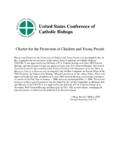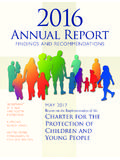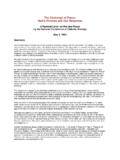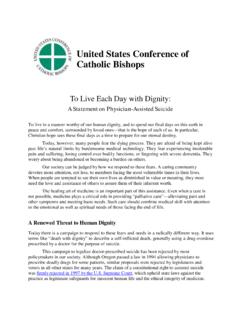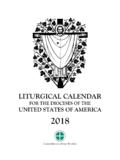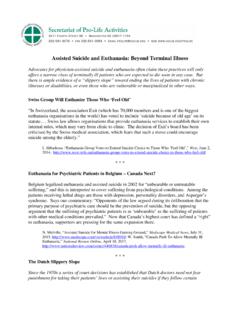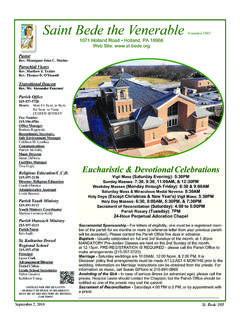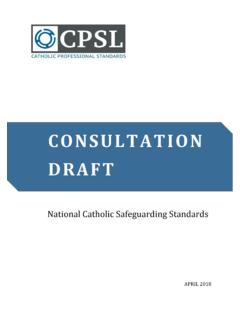Transcription of Responding to the Abuse Crisis as Committed …
1 1. Responding to the Abuse Crisis as Committed disciples Sister Sara Butler, , , 2015 Anglophone Conference, Pontifical Gregorian University Almost everyone knows how the mainstream media in the responded to the clerical sex Abuse Crisis . The Boston Globe's investigative reporting first got attention; then, the New York Times jumped on the story, and the Los Angeles Times took it up. The Philadelphia Inquirer published every sordid detail of the allegations, day after day, week after week. Once it was known that the bishops were willing to listen to accusations from the past, stories hidden for many years came to light.
2 Typical ways of dealing with the abusers also became public. Victims groups demanded, as a condition for settlement, the full disclosure of material kept in confidential clergy files and the publication of the pertinent information on the internet. The media, lawyers and insurance agents, law enforcement officials, and victims' advocacy groups investigated and exposed the woefully inadequate efforts of some bishops to avoid scandalizing the faithful, and the patterns of episcopal behavior that tragically failed to protect children, youth, and vulnerable adults. How have the Catholic faithful responded to the clerical sexual Abuse Crisis ?
3 Almost everyone knows that many Catholics have left the Church. Having lost confidence in the clergy, they give up faith in the sacramental economy, and in particular, in the sacrament of Holy Orders. Since they tend to identify the Church with her clergy, they can no longer recognize the Church as a mystery of God's love. The Committed disciples who are the focus of this talk, however, stayed, and they continue to regard the Church as the mediator of God's grace and mercy, despite their bitter disappointment and anger at the Abuse of the innocent and the many losses their local churches have suffered.
4 They cannot live without the Eucharist, and they desire 2. to contribute to healing, to support their priests and bishops, and to assume greater responsibility for the Church's life and mission themselves. One thing is clear: in the face of this Crisis , it is not possible to remain neutral. Response of the Faithful to the Revelation of Clergy Sexual Abuse1. What has been the response of Committed disciples , practicing Catholics who are loyal to the Church? Great sadness to learn that some Catholic priests were guilty of serious sins that victimized children and youth, and, for some, a desire to make reparation to the Lord for these sins.
5 Dismay and embarrassment for the bishops and priests they knew who were suddenly suspected of leading a double life and preying on youth. Outrage at the sickening stories of Abuse from the past 40 and 50 years paraded in the news media, together with ambivalence over the media's role in exposing this. Later, consternation and disbelief as attention began to be focused on the charges of malfeasance lodged against bishops who failed to report priest abusers to the police and remove them from ministry. Catholics who first felt victimized by the media now felt betrayed at learning that some bishops and major superiors of religious men seemed to be more concerned with saving the Church's reputation and assets than with protecting innocent children and youth from sexual Abuse .
6 What were they thinking?2 (This seems like the ultimate expression of clericalism.). 1. Other pastoral workers have been accused and charged, of course deacons, religious Brothers, religious Sisters, and lay ministers. I have chosen to focus on priests and bishops in order to address what I think is a critical theological issue, the nature of the ministerial priesthood. 2. See Archbishop Daniel Pilarczyk, What Were the Bishops Thinking? Origins 33 (April 1, 2004): 733-36. In the , most bishops adopted a therapeutic approach; they would send the abuser for psychological evaluation and rehabilitation with the expectation that he could eventually return to active ministry, perhaps with some restrictions on his access to children and youth.
7 Although some canon lawyers objected that the canonical provision for investigating and judging accusations against priests would better serve the cause of justice for both the accuser and the accused, the canonical approach was generally held to be less pastoral. See John J. Coughlin, 3. Committed disciples know, of course, that most priests are not guilty of abusing children and youth, but they saw that the mystique that surrounded the Catholic priesthood, based on the belief that they were set apart and consecrated to God as representatives of Jesus Christ in the midst of his Church, has suffered a serious, even fatal blow.
8 It was not just that priests were discovered to be sinners or to be subject to addictions like the rest of us. (We are saddened, but no longer shocked, to learn of clergy addicted to alcohol.) It was the nature of their offenses. Sexual Abuse of minors and vulnerable adults falls in a different category. When clerics seek to satisfy their sexual desires by preying on innocent children and youth, victims who could not know how to object and had been taught to respect and obey them, they are guilty of a heinous sin, in fact, of a crime. Committed disciples were able to distinguish between the person and the office, to see the offender as a bad apple rather than the norm, and to understand that it was unfair to suspect that all priests led a double life.
9 They watched helplessly, however, as family members, colleagues, and acquaintances whose attachment to the Church was weak or who already had issues with the Church's teaching announce that this was the last straw. The ideal of goodness, intelligence, and probity of life that they had associated with the priesthood was destroyed. If our priests are sinners, why should we listen to them or defer to them? We are all sinners, but they are the worst; they are hypocrites. Catholics of this mindset lost something precious, a OFM, The Clergy Sexual Abuse Crisis and the Spirit of Canon Law, Boston College Law Review 44:4/5 (2003): 977- 998.
10 4. confidence and conviction about the Lord's active presence in the Church through his priestly ministers and the Church's capacity to mediate his saving grace. Whereas the first wave of anger and dismay was directed at priests and bishops guilty of sexually abusing minors, the second wave was directed at the bishops and the major superiors of religious men who failed to protect children and youth from this Abuse by properly investigating, disciplining, and if necessary removing from ministry the guilty parties. There were exceptions, of course, but most bishops and major superiors had adopted strategies for Responding to claims that ultimately failed to protect minors from priests who had been accused and found guilty.
